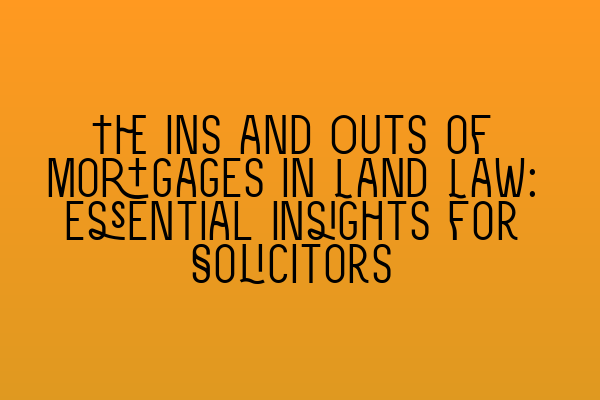The Ins and Outs of Mortgages in Land Law: Essential Insights for Solicitors
As a solicitor specializing in property law and land law, one of the most important areas of expertise you must possess is an in-depth understanding of mortgages. Mortgages play a critical role in property transactions, and a thorough comprehension of their legal intricacies is essential for providing effective advice and representation to your clients. In this blog post, we will delve into the ins and outs of mortgages in land law, providing you with the essential insights you need to excel in this area.
What Is a Mortgage?
A mortgage is a legal instrument that allows an individual or organization (the mortgagee) to secure a loan against a property owned by another party (the mortgagor). The mortgagee typically lends a sum of money to the mortgagor, who uses the property as collateral. In the event that the mortgagor defaults on the loan, the mortgagee has the right to sell the property to recover the outstanding debt.
Various Types of Mortgages
There are different types of mortgages that you may encounter when dealing with property transactions. Some of the common types include:
1. Fixed-Rate Mortgage: A fixed-rate mortgage is a type of mortgage where the interest rate remains unchanged for the entire duration of the loan. This provides the mortgagor with certainty regarding their monthly repayments, as they are unaffected by fluctuations in interest rates.
2. Adjustable-Rate Mortgage: An adjustable-rate mortgage, also known as a variable-rate mortgage, is a type of mortgage where the interest rate is subject to change over the loan term. The interest rate is typically tied to a benchmark index, such as the Bank of England base rate. Changes in the benchmark index can lead to fluctuations in the mortgage interest rate.
3. Interest-Only Mortgage: An interest-only mortgage is a type of mortgage where the mortgagor only pays the interest on the loan for a specific period, typically between five and ten years. After this period, the mortgagor is required to start repaying both the principal amount and the interest.
4. Buy-to-Let Mortgage: A buy-to-let mortgage is a type of mortgage specifically designed for individuals who wish to purchase a property for the purpose of renting it out. The rental income is used to repay the mortgage, and the property is considered an investment.
Legal Considerations in Mortgage Transactions
When advising clients on mortgage transactions, there are several legal considerations to keep in mind. These include:
1. Creation of a Legal Charge: A mortgage involves the creation of a legal charge on the property. This charge provides security for the loan and ensures that the mortgagee has a legal right to recover the outstanding debt by selling the property if the mortgagor defaults.
2. Statutory Requirements: There are specific statutory requirements that must be met for a mortgage to be valid. These requirements include compliance with the Law of Property Act 1925 and the Land Registration Act 2002. It is crucial to be familiar with these statutory provisions to ensure the legality of the mortgage.
3. Priority of Mortgages: In scenarios where multiple mortgages exist on the same property, it is important to understand the concept of priority. The priority of mortgages determines the order in which they are repaid in the event of default. Knowledge of the rules pertaining to priority is vital for protecting the interests of your clients.
4. Consumer Protection: Consumer protection laws play a significant role in mortgage transactions, especially when dealing with residential mortgages. It is essential to understand the relevant legislation, such as the Financial Services and Markets Act 2000 and the Consumer Credit Act 1974, to ensure compliance and protect the rights of your clients.
5. Foreclosure and Repossession: In the unfortunate event of default by the mortgagor, the mortgagee has the right to foreclose on the mortgage and repossess the property. However, there are legal procedures that must be followed, including providing notice to the mortgagor and seeking permission from the court. Understanding the process of foreclosure and repossession is crucial for protecting the rights of both parties involved.
Keeping Up with Land Law Developments
As a solicitor in property law and land law, it is vital to stay updated with the latest developments in this field. The law surrounding mortgages is subject to change, and it is essential to stay abreast of new legislation, case law, and regulatory requirements. Regularly attending relevant legal seminars, workshops, and conferences will help to ensure that your knowledge remains current and that you can provide the best possible advice to your clients.
Conclusion
Mortgages are a fundamental aspect of property transactions, and understanding their intricacies is crucial for solicitors specializing in property law and land law. By developing a comprehensive understanding of the different types of mortgages, the legal considerations involved, and the latest developments in this field, you can position yourself as a trusted advisor to your clients. With the essential insights provided in this blog post, you are well-equipped to handle a wide range of mortgage-related matters with confidence.
If you’re interested in further sharpening your skills, be sure to explore SQE Property Law & Land Law’s range of SQE 1 and SQE 2 preparation courses. Additionally, you can enhance your preparation with our SQE 1 practice exam questions and practice mocks, FLK1 and FLK2. Stay on top of upcoming SRA SQE exam dates to ensure you’re well-prepared to ace your examinations.
Remember, being a solicitor requires continuous learning and adapting to changes in the legal landscape. Embrace the challenge, continue expanding your knowledge, and strive for excellence in serving your clients in the ever-evolving world of mortgages and property law.
